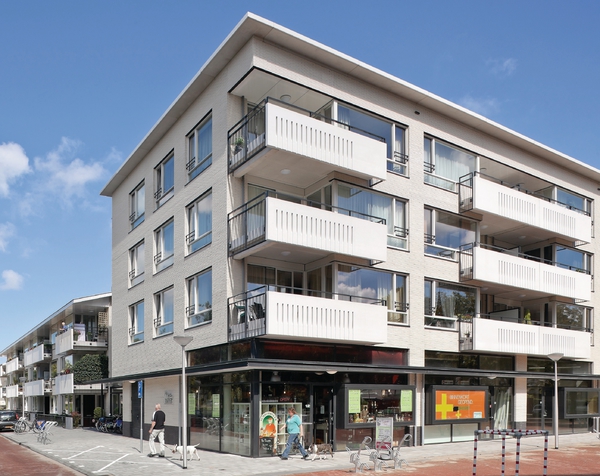Never too big to fail
In January Dutch housing giant Vestia’s finances imploded leaving it with €1.3 billion in bank debt and the sector facing a €700 million bailout package. Carl Brown examines what went wrong and whether it could happen in the UK
The government has cut funding for affordable housing and urged housing associations to take on more risk and independence to raise finance themselves. Top-down directives from central government have been replaced with a focus on local housing policies.
Regulation is reduced, allowing associations to adopt more flexible funding models. Sound familiar?
While all this applies to social housing in England in 2012, we are in fact talking about the Netherlands in the mid-1990s, when a previously tightly regulated and largely state-funded sector was effectively privatised.
Fast forward 17 years and those mid-90s dreams of financial independence are over for Dutch housing associations. Quite simply, the Dutch sector is in crisis.
Vestia, the Netherlands’ largest housing association, lost €2 billion in January after interest rate swap deals - designed to protect against interest rate increases on variable rate loans - went wrong. The 90,000-home landlord is now having to raise rents and sell stock to pay €1.3 billion back to the banks and the rest of the sector is coughing up €700 million to bail the organisation out. And Vestia is not alone.
Two other housing associations, Wooninvest and Portaal, also face financial difficulties while Dutch housing regulator Centraal Fonds Volkshuisvesting warned in May that eight housing associations do not have enough cash or assets to cover ‘margin calls’ if interest rates fall again.
The Dutch government has ordered a parliamentary inquiry into housing associations, and earlier this month announced tougher rules about their use of derivatives. Public opinion of housing associations is at an all-time low as stories about chief executives’ salaries and perceived irresponsible behaviour appear regularly in the Dutch press.
‘Except for the banks, housing associations are now the second most criticised organisations in the country,’ states Dutch housing consultant Corné Koppelaar.
But how did the sector get into this mess? And what lessons are there for housing providers and policy makers in England? Inside Housing travelled across the Netherlands, speaking to Dutch consultants, academics and housing providers, in Amsterdam, Rotterdam and the university town of Leiden, to find out.
Boom and bust
The story of the liberalisation of the Dutch housing sector began on 1 January 1995 with what is known as the Brutering, translated as ‘grossing up’, operation. Before this time associations received grants and borrowed money from central government but were largely restricted to building homes according to government plans.
Under the one-off Brutering operation, subsidies owed to housing associations by government and loan repayments associations owed to government were settled all at once. Associations replaced their government loans with private finance and they were granted complete financial independence, in return for no longer receiving grant.
Mr Koppelaar, speaking to Inside Housing in an Amsterdam hotel, says: ‘Before 1995 there was a very strong bond between the government and housing associations. Housing associations often just executed the policies of the government.
‘There were a lot of grants and subsidies in those days, if we built something new, the deficit [in development costs] would be supplied by the government.’
The 1995 reforms also encouraged mergers, and reduced restrictions on the activities associations could carry out as they were less tied to government policy. They were also allowed to keep 100 per cent of monies from selling stock.
‘From then on housing associations started to do more commercial developments, like taking part in big shopping centres and building more homes for sale,’ says Mr Koppelaar.
‘Housing associations now self-regulate more or less,’ he adds.
Easy money
Housing associations formed a body called Waarborgfonds Sociale Woningbouw, which guarantees loans for associations, enabling them to obtain triple A credit ratings. Around 95 per cent of the sector’s finance comes through two state-owned banks, BNG and Waterschapsbank. WSW checks the association’s accounts and then allows the organisation to borrow using its credit rating.
‘They’d get this letter with the triple A status and go to BNG and normally within a week they’d get the money, it was a very easy process,’ says Mr Koppelaar. ‘The banks don’t trust this triple A rating anymore,’ he adds.
Aside from WSW, there is a regulator, the CFV, which formally has the power to intervene and tell associations to improve.
Vestia’s Bomenwijk development in Delft, where homes are for social rent
But Professor Hugo Priemus, an expert in housing finance, points to clippings of newspaper articles about problems with housing associations and says the CFV is limited in its ability to act.
‘They get all the documents and give critical reviews of what has happened, but always after the fact,’ he says speaking in his home. ‘They cannot easily act in a preventative way. There are now debates as to whether they should have the power to act before large investments are made.’
Dutch housing associations became very wealthy due to increased entrepreneurial activity and low interest rates, following the ‘big bang’ of Brutering.
Stories began to crop up in Dutch newspapers about housing association salaries being too high. Former Vestia boss Erik Staal had the highest at €500,000 per year. Criticism also arose of some of associations’ activities and whether some of their more outlandish schemes were suitable for a housing provider. For instance, association Woonbron infamously lost tens of millions of euros after a scheme to buy a former cruise liner and turn it into a hotel and educational centre, went over budget.
The need to protect themselves against a spike in interest rates increasingly led Dutch housing associations to use derivatives. Dramatic interest rate rises can disrupt associations’ business plans by requiring them to pay more if their debt consists of variable rate loans. Associations enter into interest rate swap deals, where they agree to swap interest rates with another party. A report by CFV estimated that, as of last year, 162 of the Netherlands’ 400 housing associations use derivatives in this way. If interest rates fall dramatically, the housing association can be asked to demonstrate that it has enough security to cover the drop in rates.
The precise details of exactly what happened at Vestia are still a mystery. Its former treasurer Marcel de Vries was arrested and is currently the subject of a criminal fraud investigation. However, it has emerged that Vestia bought £20 billion of derivatives to protect itself against risks of assets it did not even have yet.
Erik Maassen, policy officer at the Nederlandse Woonbond, the Dutch national tenants’ association, says: ‘Vestia didn’t use them [derivatives] to minimise risk, they used them to make money and they really speculated.’
Vestia gambled that interest rates, historically at a low level, would not drop. When they did, Vestia did not have enough collateral to cover the cash call from its lenders.
‘Vestia bought derivatives worth €20 billion and their total assets were only worth €5 billion. That’s crazy,’ says Mr Koppelaar.
Too good to be true
For Mr Koppelaar and Mr Maassen, Vestia, which had morphed into a giant association through a series of mergers, had become obsessed with growth. ‘They wanted to grow so big and they thought they were untouchable,’ says Mr Koppelaar.
According to Mr Maassen, Vestia’s ability to raise low-cost finance, and spend it on social housing, led to admiration across the Dutch sector until the interest rate swap debacle earlier this year.
He says: ‘Vestia was thought of as the example for all corporations, they were really the hot thing. They were telling all the other corporations how to make more money and use it for social housing.’
Following Vestia’s crash, banks and housing associations reached an agreement under which Vestia will pay back €1.3 billion over 10 years, while the other housing associations will pay a combined €700 million.
Professor Priemus says housing associations agreed to contribute the money to protect the sector’s financial independence. Vestia boss Mr Staal received a reported €3.5 million package to leave the company.
The Vestia affair was front page news in the Netherlands and now policy makers are taking action to ensure the same problems do not happen again. The parliamentary inquiry, which in the Netherlands is a rare event reserved for cases of national crisis, will launch later this year to look into the housing association sector. Trade body Aedes is drafting new protocols governing housing finance and the Dutch government earlier this month announced tough new rules on the use of derivatives by housing associations.
‘The derivatives portfolio [held by] Vestia was much too large and its nature is not appropriate for a corporation,’ says Liesbeth Spies, who at the time of writing was minister of interior and kingdom relations, ahead of the Dutch general election on 12 September. The new rules mean associations have only ‘amateur’ investor status as opposed to professional status, meaning banks will ask more questions before selling derivatives to the organisations.
Big impact
The associations’ €700 million bail out contribution, coupled with a €620 million tax as part of the Dutch government’s austerity measures, is likely to lead to a reduction in funds available for new homes.
Vestia is increasing its rents for new tenants from an average of around 84 per cent of the legal maximum to 92 per cent to recoup its costs. It will also cut back on renovation work on its properties and is supporting proposals to allow associations to charge higher rents on households whose annual income is €34,000 or more. The organisation is also looking to sell 15,000 homes. Other associations are also likely to look at raising rents to pay off their share of the Vestia debt.
‘What really hurts is this system was designed to prevent small and not very wealthy housing associations from folding,’ says Mr Maassen. ‘Now it is the big one, with the big mouth, and tenants have to pay for it.’
Mr Maassen says there is now a lot of anger in Dutch society about housing associations, which are seen as behaving irresponsibly and spending too much on directors’ salaries and luxuries. There is certainly a contrast between the cramped offices of the tenants’ association in an Amsterdam backstreet and the futuristic Vestia headquarters in Rotterdam.
Mr Maassen says there is a current of public opinion against ‘graaiers’, which loosely translates as ‘grabbers’, similar to the English ‘fat cat’. ‘Housing company directors are really thought of in this category of people,’ he says.
So what does Vestia itself have to say about its costly errors?
When I visit the organisation’s offices on a warm August Friday afternoon most staff have already left for the weekend. Ronald Florisson, an external public relations officer, offers to answer my questions. He admits there were no checks and balances at Vestia and not a strong enough structure in place to manage derivatives. ‘It was managed by one or two people,’ he says.
Mr Florisson adds that the organisation was successfully raising money at a cheaper rate, between 0.5 per cent and 2 per cent cheaper, than other associations - so questions were not asked about the method of achieving this. ‘If things are going well, it is always difficult to put questions.’
In response to the tenants’ federation’s concern over raised rents and plans to sell homes, Mr Florisson abruptly asks what the tenants think should be done instead. ‘I don’t want to hear the complaint, I want to hear the solution,’ he says.
So could a Vestia-style catastrophe happen in England? Julian Ashby, chair of the Homes and Communities Agency regulatory committee, insists not, because the regulator, unlike the CFV, tracks interest rates and exposures through its monthly survey of providers, rather than relying on historic accounts.
Words of warning
However, all the Dutch experts Inside Housing speaks to warn that the Netherlands’ housing association crisis contains lessons for UK landlords.
Mr Florisson says the regulator in England needs to have people with the knowledge of financial markets, and even suggests the Bank of England or the Treasury should run regulation.
‘The profession of risk management, in the Netherlands and in the UK, is in its infancy,’ warns Professor Priemus, who believes associations should not take out long-term finance for undefined purposes.
As the Netherlands picks up the pieces following the Vestia affair, experts agree that a return to increased regulation of the sector, possibly through a new housing authority, is inevitable.
As they look to innovate in a world with less grant, housing associations in the England and the UK as a whole are advised to take on board some of the lessons from across the North Sea.
‘Look what happened to Vestia. Accountants have seen their accounts, the regulator has seen those accounts, the guarantee fund has seen those accounts, as have the board of directors and still it went wrong,’ Mr Koppelaar says. ‘So tell me, why could it not happen in England?’
How interest rate swaps work
As housing associations take on more debt at variable rates, the risk of unexpected costs through interest rate rises increases.
Swaps are a way for organisations, including housing associations, to exchange risks posed by the movement of interest rates. To hedge against interest rate rises on variable rate loans, the association can enter into an interest rate swap, so that it pays a fixed rate of interest to a bank, which pays the variable rate in return.
This means if interest rates rise, it is not as damaging for the association. The swap also means the association does not benefit from falling interest rates, but it does have more certainty over its costs.
Swap deals are on the condition that associations put up security at short notice to cover the difference between fixed and variable interest rates if rates fall. This is to prevent them defaulting on their loans.
Vestia gambled that interest rates would not fall, and found it did not have enough security to cover the difference between rates.
Timeline
January 1995
Dutch sector is privatised through the Brutering operation
January 2012
Dutch newspaper Het Financieele Dagblad reports Vestia has had a €1.6 billion margin call on its interest rate derivative portfolio
February 2012
Vestia confirms it has taken out a €1.6 billion emergency government-backed loan, and that it intends to sell homes and reduce its reliance on derivatives
April 2012
Vestia treasurer Marcel De Vries is arrested on suspicion of fraud
May 2012
Regulator the Centraal Fonds Volkshuisvesting publishes a report saying eight other associations do not have enough liquidity if rates drop more than expected
June 2012
A deal is agreed, which will see Vestia pay back €1.3 billion over 10 years, while the rest of the sector, through the CFV, will contribute €700 million. Vestia agrees to sell 15,000 homes over 10 years
June 2012
Liesbeth Spies, minister of interior and kingdom relations, says the sector will ‘incur additional charges’ for years as a result of the Vestia affair
September 2012
The Dutch government announces new rules on derivatives for housing associations











